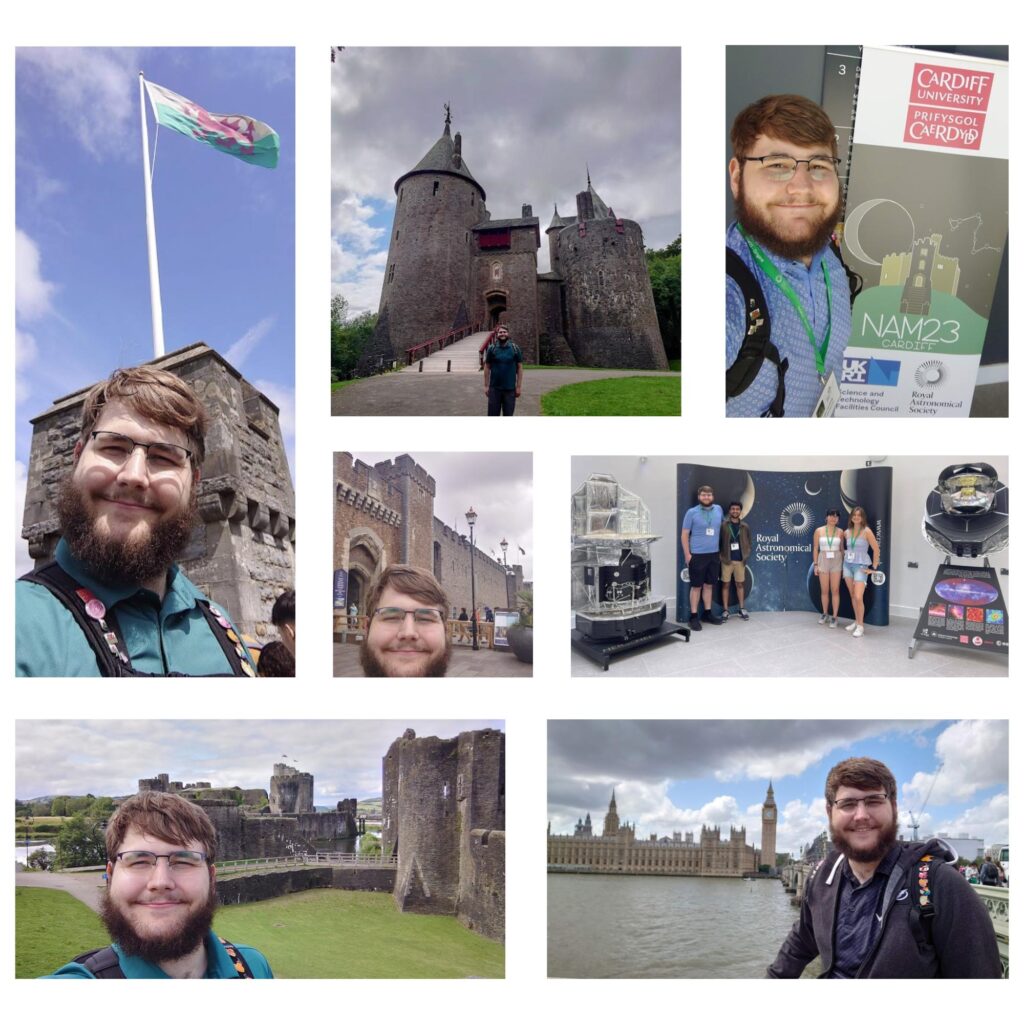
Last summer, I went abroad on a fully-funded internship doing astrophysics research at Cardiff University, in Cardiff, Wales, UK. This experience not only solidified my career decision to pursue astrophysics research, but also gave me a unique immersion into Wales and Welsh culture as well as the broader United Kingdom. If you are curious about research abroad, read on!
My summer program was offered through Princeton’s International Internship Program (IIP), which connects Princeton students with organizations around the world to receive fully-funded internships abroad. My internship was hosted by the Cardiff University School of Physics & Astronomy, which has topics ranging through Optics and Photonics, Condensed Matter Physics, Astrophysics, and Brain Imaging. Many of the projects offered are in Astrophysics, but students can work in any of these topics, so my year had students working in Engineering Physics and Computer Science, not just Astrophysics. Once admitted to this program, the advisers are very flexible with what project you work on, and they really helped work with each of the students to make sure we were doing projects that suited our interests.
I lived and worked in Cardiff, the capital city of Wales, so each day before going to work I would get to walk through the city from my housing to the university buildings in town. On the way, I crossed the River Taff and walked through the beautiful Bute Park to get to the center of town: right in front of the massive Cardiff Castle. After working on my project, I would walk through the city busy with stores (some new to me and some recognizable as an American) and people. Getting to walk through all of this every day was a treat; it had the perfect blend of historic nature and bustling metropolitan. Cardiff isn’t quite as busy as London, but it’s got a lot more than some of the rural cities in the UK, and it is able to scratch both itches surprisingly well.
On site, the role of my internship was primarily focused on research, so my day-to-day involved working with large data sets from radio telescopes and writing code to process the data, often reading papers or meeting with my adviser to talk about the background and what kind of approach I should take. The Physics & Astronomy department at Cardiff University was warm and welcoming. I felt like I was one of the graduate students (though with a much shorter project than their PhD theses…). Tea breaks, lunches, and department get-togethers were frequent, so I found myself becoming deeply connected with all of the faculty and students there over the course of my summer. We went go-karting and hosted Astronomy On Tap at a local bar, where graduate students and professors gave talks about astronomy and played trivia games with the general public.
Cardiff University was coincidentally hosting this year’s National Astronomy Meeting, the UK’s major astronomy conference, so I got to meet researchers from all over the UK and hear them talk about their work. This was my first ever scientific conference, and it was one of the best research experiences I’ve ever had, convincing me that I want to do research and attend more conferences!
Outside of the office, living abroad for a summer in Cardiff gave me the opportunity to fully immerse myself in the culture of Wales and the UK. In Wales I visited local markets, an international food festival, and visited castles Cardiff, Coch, and Caerphilly as I went hiking around the more rural parts of Cardiff. I also was able to take the train over to England and visit London, Oxford, and the ancient Roman city of Bath. The interconnectedness of the trains in the UK and the blend of their cities with nature is something I had never seen before having only lived in the US. Sightseeing and traveling is encouraged, and any IIP will give you plenty of opportunities to enjoy all parts of wherever in the world you go.
You can learn more about the overall program by visiting the IIP website or search for a specific internship that may focus on an area of interest. They offer internships across Europe, Asia, Africa, South America, and Australia that span topics in STEM, Social Sciences, Health, Law, Humanities, and more. The Office of International Programs also has a “Create Your Own” IIP-like program called the Streicker Fellows Program, where you can get funding for an international internship not listed as an established IIP—this can be helpful if you want to work in a specific country, organization, or field that isn’t offered as an IIP. If you are unsure about what program or country would be right for you, or what you should do to prepare your application, you can talk with an IIP adviser (though make an appointment quickly, as they fill up fast) about your questions or email them to iip@princeton.edu if you’d like. The IIP Application for this upcoming Summer 2024 cycle is Monday, December 4th at 3:00 pm Eastern, so I recommend that interested applicants select their top choices and prepare their application soon (most programs also require two academic or professional references, so you should reach out to faculty members now to ask if they would be willing for you to put down their contact information as a reference for the application).
If you’ve ever thought about doing research over the summer, consider doing so abroad! Likewise, if you’ve ever wanted to study abroad, consider going abroad while getting research and industry experience! Regardless of why you do an IIP or which one you do, it will be an unforgettable experience that will shape what you want to do and where you might want to be in the future.
— Xander Jenkin, Natural Sciences Correspondent

